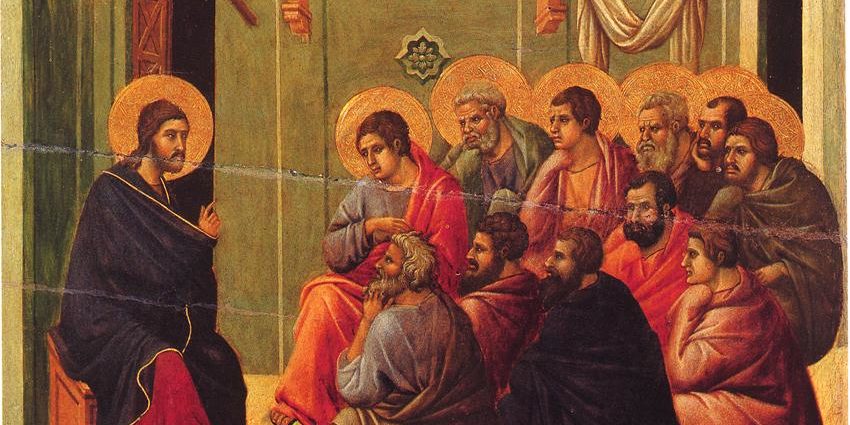
5 Reasons Why You Should Reflect on the Final Days of Jesus
Writing the book, The Final Days of Jesus, has been life-changing. Immersing oneself in the last week of Jesus’ earthly life culminating in his death and resurrection gives one a whole new appreciation for how vital this week is in human history. In this short piece, I submit five major reasons why you, too, should reflect on the final days of Jesus at this time of year—and any other time for that matter!
1. This is the most important week in the life of the most important person who ever lived!
Even the agnostic actor Hugh Bonneville, best known for his role as Lord Grantham in Downton Abbey, agrees: “Whether you are a person of faith or of none, you cannot escape the fact that the last six days of this man’s life, and his death, changed the world.” Bonneville is speaking about his new hour-long documentary Jesus: Countdown to Calvary, referring to “the last six days of Jesus” as the time between Palm Sunday and Good Friday—to which I’d add Easter Sunday.
The four biblical Gospels devote extensive coverage to Jesus’ final week, so much so that one well-known German scholar, Ernst Käsemann, famously wrote that Mark’s Gospel is “a passion narrative with an extended introduction.” The life and earthly ministry of Jesus climax in the events surrounding his death, burial, and resurrection, historical events that are at the heart of the Christian gospel that has indisputably impacted the world.
2. In our busy lives in which we’re occupied with many things—many good, some perhaps not so good or essential—reflecting on Jesus’ final week will help refocus our lives on what is central to our faith.
Paul wrote to the church at Corinth, a wealthy seaport, that he had resolved to preach nothing except Christ crucified (1 Cor 2:2). He noted that the message of the cross was foolishness to those who perished but life to those who believed (1 Cor 1:18). When I speak or teach on just about any subject, there is the consistent call to preach the cross. If I’ve neglected to draw attention to this most vital element of the gospel message—the most essential ingredient to the salvation and forgiveness of sin that can be found in no one else but Jesus— I’ve missed the main point.
3. Reflecting on Jesus’ final week will help you understand the biblical Gospels better.
In fact, there is only one gospel, the fourfold gospel, according to four witnesses: Matthew, Mark, Luke, and John. Recall that Deuteronomy stipulates that every matter must be established by at least two or three witnesses (Deut 19:15). Reflect that God, in his providence, gave us four Gospels—an embarrassment of riches testifying to the story, and history, of Jesus! Though scholars sometimes identify the relationship between Matthew, Mark, and Luke as the “Synoptic problem,” revealing a critical bias toward the reliability of these writings, what should be remembered is rather a “Synoptic blessing” or “Synoptic opportunity.” Arguably, having four Gospels that complement and supplement one another is an asset, not a liability.
Take Jesus’ resurrection appearances scattered throughout the different Gospels, for example, as they jointly reveal the full story. The Gospels (and Paul’s letters) record close to a dozen resurrection appearances of Jesus to his followers. None has all of these, but each (except for Mark, who ends on a teaser) features at least one if not two or more such manifestations. Taken together, the New Testament writings provide an exceedingly thorough account of Jesus’ very busy first day—and first week—following the resurrection. At one point, Paul tells us, Jesus even appeared to 500 people at the same time (1 Cor 15:6)!
Note also that the Synoptics (Matthew, Mark, and Luke) focus on Jesus’ Jewish trial before the Sanhedrin while John mentions the Jewish trial only in passing, in one single verse (John 18:28). Instead, John focuses on the informal hearing before Annas, the high-priestly patriarch, and on Jesus’ Roman trial before the governor, Pontius Pilate. Here we see how John presupposes and deliberately supplements the Synoptic accounts. So, while you can get the story of Jesus’ final days in any of the four New Testament Gospels, to get a full picture of Jesus’ final days you’ll need to read all of them.
4. Reflecting on the final days of Jesus is a valuable exercise any day of the year, but it is beneficial especially at the time when all of Christendom celebrates Easter while the rest of the world takes note even featuring Easter specials in the news media and on cable television.
Pondering the significance of the final days of Jesus during the week(s) prior to Easter can aid us when we dialogue with unchurched neighbors and friends or relatives who go to church only once or twice a year—at Christmas, and on Easter Sunday. While we need not reenact the events of Jesus’ final week as Roman Catholics do in their stations to the cross on the Via Dolorosa, we do well to reflect on the pain Jesus endured and the lengths to which he went to save us. Meditating on these truths can be a deeply devotional and spiritually transformative experience. It can also help us lead others to faith, or at least point them to Jesus, as we take the opportunity to explain to them the true meaning of the cross.
I still remember when, as an unbeliever, I looked at the crucifix in the Roman Catholic Church I attended as a boy, being utterly at a loss as to why Jesus was hanging on the cross. I remember thinking, “Why is he there? What is he doing?” I had no clue why Jesus, as the God-man, must die as the sinless substitute for my sin on the cross, so I could be forgiven and be reconciled to God. It was here that Jesus averted God’s wrath that rested on me, not only because I had done wrong but because I was (and still am) a sinner—but now Jesus has paid for all my sins past, present, and future. I understand now and cherish the incredible hope of spending eternity with God in heaven.
I close with the most important reason.
5. At the core, the true Christian faith is not merely a set of abstract beliefs or list of doctrines to be affirmed. Rather, it is a series of events that took place historically in the life of Jesus: his crucifixion, burial, and resurrection. The grand narrative of Scripture climaxes in the historical depiction of Jesus and the salvation he procured.
Yes, Christianity is vitally centered on a person—the Lord and Savior Jesus Christ, the Messiah and incarnate Word of God. The Christian faith is a deeply personal faith. At the heart, Christianity is Jesus. And the story of Jesus is more than just a story—it is true history. Jesus died, was buried, and rose from the dead historically (not merely textually, as one of my students once affirmed!). Paul rightly affirms emphatically that if Jesus didn’t rise from the dead, we’re still in our sins and our faith is in vain (1 Cor 15:14, 17).
What’s more, Jesus’ crucifixion, burial, and resurrection are inextricably tied together. If Jesus had merely died and been buried but hadn’t risen from the dead, would his death save us? Of course, this is only a hypothetical scenario because Jesus did, in fact, rise from the dead. But if he hadn’t, I believe this would have been insufficient, because it is by his resurrection that Jesus was vindicated by God, rose triumphantly from the grave, and opened for us the possibility of sharing in his new life.
As Paul affirms, Jesus was the firstborn from the dead (Col 1:18). His resurrection is essential to our faith. That’s why the first Christians didn’t stop proclaiming the resurrection. All three events—cross, burial, and resurrection—are vital and belong together.
The cross is where Jesus died effectively for our redemption. The burial proves that Jesus was truly dead—that his death was a real death for us rather than Jesus being merely a phantom or apparition. And his resurrection is the final exclamation point in the story. The resurrection is what John the evangelist presents as Jesus’ “glorification”—his amazing victory over death, the greatest of all miracles which is utterly unique in human history.
You Are Invited
Hugh Bonneville is right when he says, “Whether you are a person of faith or of none, you cannot escape the fact that the last six [make that eight] days of this man’s life, and his death, changed the world.” No one can legitimately deny that the events in Jesus’ life from Palm Sunday to Easter Sunday changed the world. They also changed my life forever.
But what about you? Perhaps this Easter you’ll come to the realization that Jesus was more than a mere man—that he was God in the flesh who took upon himself your sins and that you desperately need what he has to offer: redemption from sin and eternal life.
As the early Christians proclaimed, “There is salvation in no one else, for there is no other name under heaven given among men by which we must be saved” (Acts 4:12).
Andreas J. Köstenberger is founder of Biblical Foundations™, author, editor, or translator of about 50 books on a variety of biblical and theological topics, and the editor of the Journal of the Evangelical Theological Society. He currently serves as Senior Research Professor of New Testament and Biblical Theology at Southeastern Baptist Theological Seminary in Wake Forest, NC.

